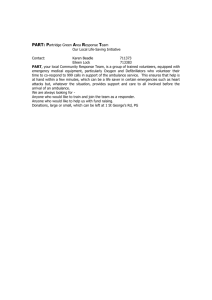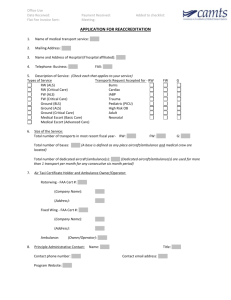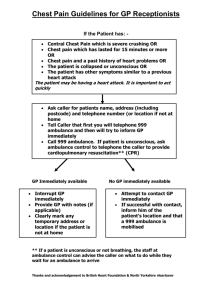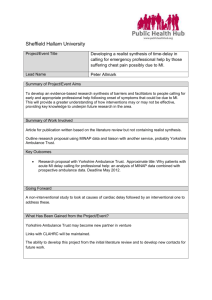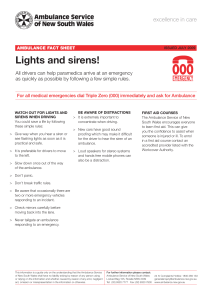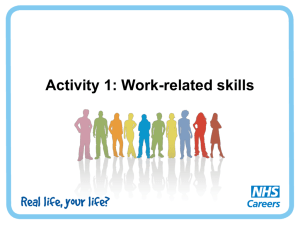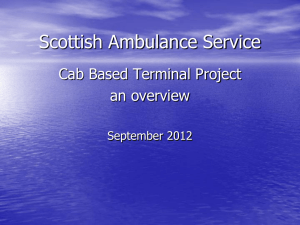Auto Wreck by Karl Shapiro
advertisement
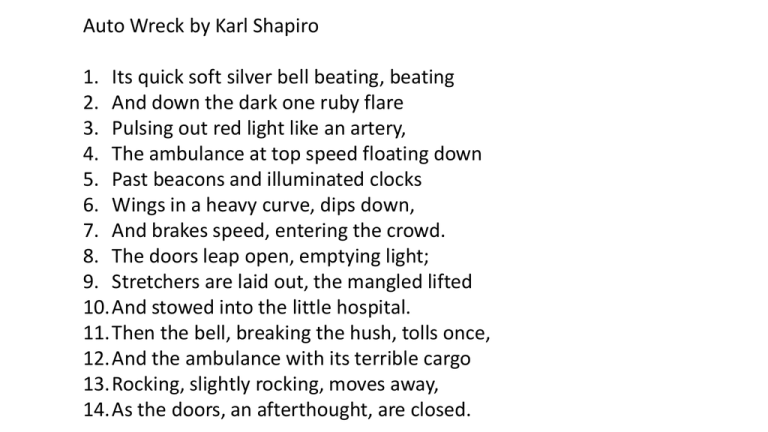
Auto Wreck by Karl Shapiro 1. Its quick soft silver bell beating, beating 2. And down the dark one ruby flare 3. Pulsing out red light like an artery, 4. The ambulance at top speed floating down 5. Past beacons and illuminated clocks 6. Wings in a heavy curve, dips down, 7. And brakes speed, entering the crowd. 8. The doors leap open, emptying light; 9. Stretchers are laid out, the mangled lifted 10.And stowed into the little hospital. 11.Then the bell, breaking the hush, tolls once, 12.And the ambulance with its terrible cargo 13.Rocking, slightly rocking, moves away, 14.As the doors, an afterthought, are closed. 15.We are deranged, walking among the cops 16.Who sweep glass and are large and composed. 17.One is still making notes under the light. 18.One with a bucket douches ponds of blood 19.Into the street and gutter. 20.One hangs lanterns on the wrecks that cling, 21.Empty husks of locusts, to iron poles. 22. 23. 24. 25. 26. 27. 28. 29. Our throats were tight as tourniquets, Our feet were bound with splints,but now, Like convalescents intimate and gauche, We speak through sickly smiles and warn With the stubborn saw of common sense, The grimjoke and the banal reslolution. The traffic moves around with care, But we remain, touching a wound 30. 31. 32. 33. 34. 35. 36. 37. 38. 39. That opens to our richest horror. Already old, the question. Who shalld ie? Becomes unspoken Who is innocent? For death in war is done by hands; Suicide has cause and stillbirth, logic; And cancer, simple as a flower, blooms. But this invites the occult mind, Cancels our physics with a sneer, And spatters all we knew of denouement. Across the expedient and wicked stones. Topic A car crash Summary The poem starts with a description of an ambulance rushing to the scene of a crash, and hurriedly gathering up the victims and rushing them away. The second and third stanzas explore the emotions felt after the car crash from the perspective of witnesses. Theme A major theme from “Auto Wreck” is death. The author is exploring the random and illogical nature of mortality by contrasting the car crash with other forms of death (war, suicide, stillbirth, cancer) that are more understandable Mood Gloomy, reflective Its quick soft silver bell beating, beating Its – Refers to the ambulance Alliteration: soft silver AND bell beating, beating Repetition: beating, beating [It shows the persistence and loudness of the bell. Quick : suggest the ambulance arrived quickly, the ambulance is moving fast, the bell is ringing quickly. Paradox: soft silver bell, beating beating. The bell is a soft colour or it is quiet. If the word soft means “not loud” then it contrasts with the beating of the bell. And down the dark one ruby flare And down the dark – The road is dark. Accident happened at night. One ruby flare: The ruby flare contrasts with the soft siren ruby: red. flare: Red signal put on road to designate accident area. Pulsing out red light like an artery, Pulsing– referring to the heart beat of a person Simile: The flare gives off red light like an open artery would spill out red blood The line prepares you for the scene of the accident The ambulance at top speed floating down Contrast– top speed vs floating down. The ambulance moves very fast but seems to be only floating peacefully to the scene Past beacons and illuminated clocks Beacons – flashing light Illuminated– something made bright with light The beacons and the clocks show the rationality of the world. The world is reasonable, organised and ordered. An accident upsets that rationality because an accident is the opposite of that which makes sense. Wings in a heavy curve, dips down, In the previous line the ambulance was floating, Now it has wings, and it dips down. Is it flying??? Is the ambulance compared to a bird or angel? IMAGE This is called an image. The words: Floating Wings Dip down They all suggest the ambulance is like a bird/angel. And brakes speed, entering the crowd. The ambulance slows down It stops in the crowd • There is already a crowd gathered to watch what is going on. The doors leap open, emptying light; Immediately there is action. Light spills out from the ambulance as the doors open. The ambulance brings the order, sterility and control of the hospital environment to the crash scene. Stretchers are laid out, the mangled lifted • Stretchers are laid out: usually the words “laid out” are used for a corpse being laid out. It seems the victims are dead and are being laid out on the stretchers. • Mangled: crushed, mashed, twisted and contorted. And stowed into the little hospital • Stowed: The injured are put away, packed, stored in the ambulance. • The ambulance is compared with being a little hospital. The injured are handled like objects that need to be transported. They are dehumanised. Line 11 Then the bell, breaking the hush,tolls once, • The bell of the ambulance tolls once, like a church bell announcing death. • It seems everybody at the scene was quiet. Line 12 And the ambulance with its terrible cargo, • The victims are dead, hence the phrase “terrible cargo”. • Cargo: load, freight, consignment, shipment goods, payload. You do not use the word cargo to refer to human beings. Human beings travelling are called tourists, passengers, patients Line 13 Rocking, slightly rocking, moves away. , • The rocking is a soothing image of a baby being rocked to sleep. Although the victims are called cargo, the ambulance transports them very gently. Line 14 As the doors, and afterthought, are closed • The crew of the ambulance is never mentioned. , • The doors are closed as an afterthought implying no gentleness is needed with the patients. • The patients might be dead. The ambulance moves quickly, but is being described as detached and inhuman. Line 15 We are deranged, walking among the cops, • We: The victims, the spirits of the victims. • Deranged: upset, unsettled, shaken. The word deranged also means “wreck” implying that the we are as wrecked as the wrecks of the accident. • The cops: apart from the medical personel, the cops would be the only people allowed close to the accident scene. Line 16 Who sweep glass and are large and composed. • Who: refers to the cops , • Large and composed: they seem used to these accidents and are not upset by the wreckage, broken glass or injuries that they find. • Large: they seem to be everywhere Line 17 One is still making notes under the light. • One: a cop , • Making notes: he is writing down what the witnesses have said. • Light: light brings order to the chaos. In darkness everything would be confused. Line 18 - 19 One with a bucket douches ponds of blood Into the street and gutter. • One: A policeman. They are called one because they are anonymous. • Bucket: they came prepared to the scene. • Douches: You clean part of your body by squirting water. The word douche is used to link the blood with the human body. Blood is the life of the body and by washing away the blood, he might as well be washing away the life (body) of the victim. • Ponds: pools of blood on the street. The victims lost an enormous amount of blood. • Into the street and gutter: no respect for the remains. It is washed in the street and gutter as if it is only rubbish. Line 20 One hangs lanterns on the wrecks that cling, • One: a policemen • Lanterns: they want to light up the accident scene • Lanterns on the wrecks that cling,: The wrecks cling to something, the next line will say what. Empty husks of locusts, to iron poles • The wreck looks like the empty husk of a locust. The wreck clings to the iron poles. The car/vehicle must have driven into the iron (strong) poles and wrapped itself around it. Now it clings onto them. The vehicle is only a husk because the living has been removed from it, it is now dead. • The vehicle is compared to a locust, with the driver removed it is only the empty husk of a locust. Line 21 Our throats were tight as tourniquets, • Our: This is still the speaker, either the spirit of the victims or the spectators. • Tourniquets: A device used to stop bleeding. Something is tightened around an arm or leg until the blood flow is cut off. • • Throats were tight as tourniquets: simile. The speakers were unable to make any noise because their throats were tight. Line 22 Our feet were bound with splints, but now, • Splint: used to immobilize a broken bone • Their feet were were broken so they were unable to move. • But now: Indicates a change. Although they can’t scream or move around, there is maybe something else they can do. Line 23 Like convalesents intimate and gauche, • Convalescents: a patient recovering from an illness • Intimate: close, cosy, private and personal • Gauche: lacking grace or tact in social situations • They are like recovering patients who are private and personal, but they also lack the social skills to communicate properly Line 24 We speak through sickly smiles and warn • Because they cannot communicate properly they use sickly smiles. • A sickly smile is not a proper smile. • They try to warn others about something. Line 25 With the stubborn saw of common sense, • They try to use common sense when they warn others. • Metaphor: common sense is like a saw, a stubborn saw that will go through anything. • A stubborn saw: Personification. The saw is described as being stubborn. • Stubborn: immovable, persistent, dogged, determined • The saw is determined to saw. • This accident must be able to be explained using your common sense Line 26 The grim joke and the banal resolution • Grim joke: oxymoron A joke is supposed to be funny and humorous. “Grim” is the opposite of a joke. It means you are depressing, bleak, unwell, indisposed. • Banal: boringly ordinary and lacking in originality • Resolution: the process of solving something such as a problem or dispute. • • The poet might be trying to solve the problem of “Why do accidents happen?” Line 27 The traffic moves around with care, • The traffic moves past the accident scene with care. They drive slowly. Line 28 But we remain, touching a wound • We: “those who died” or the reader • Those who died, remain in a sense. • Touching a wound: metaphor They touch an issue that is as sensitive as a wound. Line 29 That opens to our richest horror. • The wound is sensitive. It opens up like a wound and reveals the hurt. • Richest horror: The answer to their question horrifies them and shocks maybe everybody else. Line 30 Already old, the question. Who shall die? • The question that they try to answer is a horror and has been asked for a very long time. • Who shall die? If there is an accidents, who decides who dies and who shall live? Line 31 Becomes unspoken Who is innocent? • Will the innocent die? • Will the innocent not die? • Can you actually debate about this question. Line 32 • In these lines the poet tries to explain that there are instances when death makes sense. You can give a reason why death occurred. Line 33-35 For death in war is done by hands • If somebody dies in a war you can explain it and say the person was killed by somebody else. Line 33 Suicide has cause and stillbirth, logic; • People commit suicide for a reason. • If a baby is born still you can determine medically why. You answer will be derived from logic. Line 34 But this invites the occult mind, • This: car accidents • Occult: not understandable by ordinary human beings, supernatural, magic, witchcraft • To explain an accident you may have to search for answers in the supernatural world. Line 36 Cancels our physics with a sneer, • Physics: we can determine with science who will die but not when it comes to accidents. • Sneer: grimace, smirk, evil eye, stare Line 37 And spatters all we knew of denouement. • Spatters: you normally talk about blood spatter so the image of the accident victim spilling blood is continued here. • Denouement: a final part of a story or drama in which everything is made clear and no questions or surprises remain. • An accident leaves you with more questions when you die. A drama or novel ends with denouement, the story ends properly. • The writer says death from an accident robs you of your Line 38 denouement. Across the expedient and wicked stones. • Expedient: convenient, practical, useful, beneficial, appropriate, fitting, suitable • Wicked: evil, bad, wrong, depraved, immoral, iniquitous, sinful, impious, heinous, nefarious, fiendish • The stones are conveniently there to absorb the blood spatters from the accident. The stones are called wicked because they don’t seem to mind absorbing the victims. • Stone: May also be a play of words where it can refer to tombstones. Line 39
